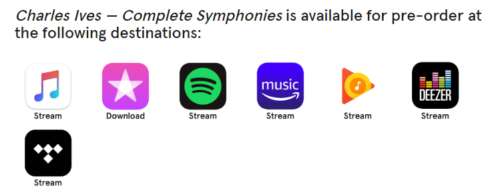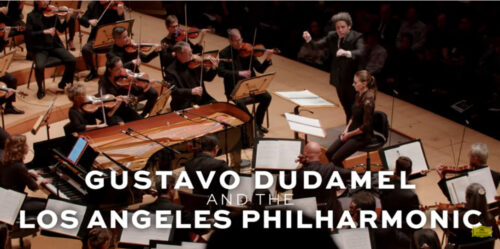THE IVES’ HAVE IT!
A little over week before the COVID-19 pandemic began shutting down the arts world as we know it, the Los Angeles Philharmonic presented an apotheosis to its already glorious season: Under Gustavo Dudamel’s leadership, a series of concerts offered the final three, and some say best, symphonies of Dvořák. Played alongside the Seventh, Eighth and Ninth were the complete symphonies of one Charles Ives, an iconoclastic composer who mashed-up the traditional classical form with the colloquial sounds of modern twentieth-century musical forms, both pioneering and exploiting techniques of polytonality, polyrhythm and textural complexity. Dudamel’s were the best renderings I have ever heard, and how lucky was I to see these concerts live?
 Well, now the Ives Symphonies are available in a new 2-CD-length release, available digitally on August 28, 2020. And the best news of all is this: these glorious concerts, recorded live at the Walt Disney Concert Hall in February 2020, sound even better than in person. Forget the hisses, coughs, and hollow sounds associated with live recordings; these all sound as if recorded in a studio.
Well, now the Ives Symphonies are available in a new 2-CD-length release, available digitally on August 28, 2020. And the best news of all is this: these glorious concerts, recorded live at the Walt Disney Concert Hall in February 2020, sound even better than in person. Forget the hisses, coughs, and hollow sounds associated with live recordings; these all sound as if recorded in a studio.
Charles Ives – Complete Symphonies represents a significant new addition to the Deutsche Grammophon catalog. The Yellow Label’s album opens with the First Symphony, written between 1898 and 1908 but not performed complete until 1953. The five-movement Second Symphony (c.1907–09 with later revisions) underlines Ives’ maverick status with its ultra-progressive combination of European classical and American popular influences. Subtitled “The Camp Meeting,” the Third Symphony (1908–11) received the Pulitzer Prize for Music in 1947, noted for its nostalgic reflections on the hymns, marches and campfire tunes of the composer’s New England childhood. The Fourth Symphony (c.1912–18 with later revisions) received its premiere in 1965, more than a decade after Ives’ death, and remains a benchmark of musical invention, ingenuity and ambition.
Charles Ives was born in 1874 in Danbury, Connecticut. His father was the youngest bandmaster in the Union Army during the American Civil War and encouraged his son to make music. Young Ives also excelled at baseball and American football. He received a solid grounding in harmony and counterpoint from his composition professor at Yale University, and ran experiments in mixing different types of music with the Hyperion Theater Orchestra. Ives made his living in the insurance business and composed in his spare time, a practical arrangement that delivered great creative freedom. This staunchly independent thinker synthesized the American folk tunes and hymns of his childhood with his own aesthetic, using techniques such as bitonality and polyrhythms decades before they entered the standard 20th-century composition toolbox to create a unique sound and a personal voice – truly, an American original.
Charles Ives (1874-1954)
COMPLETE SYMPHONIES
Los Angeles Philharmonic
Gustavo Dudamel
Los Angeles Master Chorale
Marta Gardolińska
Deutsche Grammophon
released August 28, 2020
Track List:
Symphony No. 1
I. Allegro con moto
II. Adagio molto. Sostenuto
III. Scherzo. Vivace
IV. Allegro molto
Symphony No. 2
I. Andante moderato
II. Allegro
III. Adagio cantabile
IV. Lento maestoso
V. Allegro molto vivace
Symphony No. 3 (The Camp Meeting)
I. “Old Folks Gatherin’” – Andante maestoso
II. “Children’s Day” – Allegro moderato
III. “Communion” – Largo
Symphony No. 4
I.Prelude. Maestoso
II. Comedy. Allegretto
III. Fugue. Andante moderato
IV. Finale. Very slowly – Largo maestoso
photo of Gustavo Dudamel © Danny Clinch



